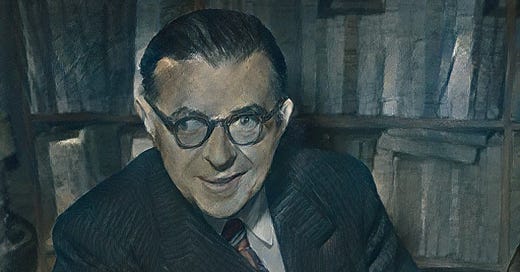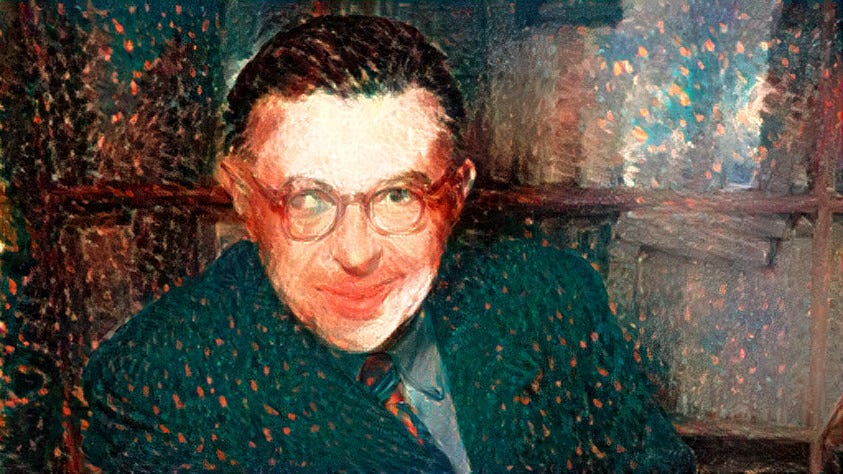Dear Mr Smith,
Thank you once again for giving space for my letters. As I continue to explore the threads of ideologies and politics that have formed the fabric of our world today, I thought I’d share some of my findings. Today, if you don’t mind, it is about philosopher and socialist intellectual, Jean Paul Sartre. Rather than burdening you with a summary of his works and history, I thought to highlight a few key ideas of his which have stood out to me as both interesting and problematic.
JEAN PAUL SARTRE AND ODDITY
Jean Paul Sartre’s interesting and confusing views on reality are intriging; his view on ‘absurdity’ and the nature of existence in relation to categorisation for example. He and his contemporaries highlighted an odd phenomenon experienced by some people; detaching preconceived meaning from something of interest and viewing it ‘as it is’. This is often accompanied by a strange feeling as one begins to question what it is you are observing, and why such an object, word, or action has been attributed the meaning often attach to it. I have personally experienced many such moments of ‘oddity’ when observing - lets say - an object or a term (literaly looking intently at a word on a page and experiencing it fully). Although I do not know how or why, there can be a moment of ‘clarity’ with such experiences. Something, I guess, that struck Sartre and his existentialist friends as significant - pointing to a reality beyond what we normally accept or what we have been taught.
The general theme throughout his work is that the world does not have to be the way it appears to be. This is true, and rather interesting to consider in specific scenarios or in the context of particularly preconceptions and ideas. It is an interesting concept to think about. Why is it that we have attributed particular meanings, terms, or values to objects, events, ideas, etc? Going beyond them one may be able to come to a deeper understanding about the world which they inhabit, and why it is ‘the way that it is’. I guess for a large part this has been the role of philosophy. I find this fascinating, but at the same time can see that taken to an extreme would be rather destructive - like the hyperreality of a psychotic episode.
Where Sartre - and many other existentialist thinkers - go astray, I believe, is when they attempt to make sense of such phenomena within an ideological, agenda driven, framework. The belief that often accompanies this school of thought is that ‘knowledge’ about the world is merely a limitation imposed by a power structure upon those who choose to (often unwillingly) accept it. Therefore, society is ‘captive’ to these ideas which limit our ability to map other meanings to particular ideas, objects, and so on.
In my opinion this can be true, and it is certainly possible that tyrannical societies - as George Orwell articulated so well - could manipulate language in a way which would also constrain the societies ability to think and process greater ideas beyond what has been ‘accepted’.
SARTRE: DANGEROUS IDEAS
It strikes me as dangerous to just accept Satre’s views as completely ‘liberating’, albeit as interesting as those views are. There is an openness that I admire but also a very pessimistic view of society and the ordinary observance of reality.
Rather than finding deeper meanings, the general direction that Sartre’s ideas lead the reader into deconstruction. The reader must deconstruct the world around him in order to be, supposedly, liberated from the limitation imposed on him. Of course, this ignores the fact that accepted systems of organisation are not only important, but necesary for a functional society. To remove all preconceived meanings would be to set oneself up for a life of absolute meaningless confusion - Sartre’s initially interesting observations become a pessimistic set of instructions on how to deconstruct society.
It is interesting to note that Sartre had an admiration for Michel Foucault. I believe this is important to understand when critiquing any system or structure. Foucault - often considered the face of postmodernism - held a similarly negative view on capitalism and its necessity within a given society. As a result, Sartre also moved into the realm of economic criticism. The general premise of his critique of ‘capitalism’ is that currency and transactions between people limit their ability to experience the world. To Sartre, capitalism presented itself as a roadblock to freedom, and did so by posing itself as a ‘necessity’ within society when - according to him - it was not.
Sartre argues that capitalism also puts unnecessary focus on the material world rather than the world of lived experience. Again, I do believe this can be the case, and indeed we are seeing how far this can go in our current society. However, his thoughst on this topic led him to revere Karl Marx and thought Marx’s ideas liberating. This is where I believe Sartre made his biggest mistake. Why? Because Marxism solves none of the problems - both literally and even within his own writings - that Sartre believed emerged within a capitalist society. Marxism, Critical Theory, and neo-Marxist schools of thought do not address the issue of materialism over lived experience in any meaningful way, nor do they address the pressing issue of how to ‘liberate’ a population from its preconceptions while simultaneously leading them to something better than what already was.
As an interesting side note, Sartre - who adhered to much of Marx’s writings - does seem somewhat at odds with the philosophy of Hegel (who inspired Marx), due to his ‘deconstructionist’ views on certain things (Hegel believed parts can only be understood within context of the whole). However, it seems possible to me that Sartre’s ideas were leading the way to a Hegelian dialectical outlook on reality, where the things ‘unbound’ to meaning serve as the antithesis to the things ‘bound’ to preconceived meaning and ideas, which would be the thesis. Thus, these dialectical opposites clash until the synthesis emerges and pushes history forward, fulfilling the Hegelian cycle. This is just my hypothesis after glancing over some of his ideas - let me know if you think I’m on the mark here or not.
IMPOSSIBLE SOLUTIONS
My overarching issue with Sartre’s critiques is that he fails to recognise the utility of our understanding of the world. The ‘systems’ in place were not developed overnight, but rather tried and tested over hundreds or thousands of years in order to grasp the world as we do. It is not true that all foundational elements within a system are inherently limiting and therefore bad. Of course, some elements of the system has its problems - as we may be more aware than Sartre may have been - including rampant corruption, a loss of transcendent meaning, and the blind acceptance of ‘truth’ as a result of ‘authority’ (something I partially agree with Michel Foucault on… to some extent). And you have made me aware of how the left hemisphere is implicated in all of this.
However, if we were to liberate ourselves from our preconceptions and patterns of thought, as Sartre suggests, this would mean a complete deconstruction of society. This is in line with the Marxian goal, and will yield the same Marxian results if seen to its end. This is not something to be taken lightly; if we were willing to deconstruct the foundations of a society which formed over hundreds of years, we better have something equally beneficial or better to replace it with. But we don’t.
It is here that Sartre encounters the issue which has hindered many post-enlightenment thinkers (particularly socialists) - a better solution. And I think many simply ignore this glaring inconsistency, while others claim that the answer lay in various forms of Communism! I think there’s simply a lack of understanding here. A society is an incredibly complex system, and broad ‘solutions’ to broad ‘problems’ often fall short, and fail to account for the near-inconceivable number of variables within the larger system. The whole idea that we must ‘replace the system’ is simply wrong; it is simplistic and shows a lack of understanding of what a society actually is. And this probably goes back to what you were saying about a mechanistic view of an organic world - it just doesn’t work.
From my perspective, the best way of fixing and improving the ‘system’ for a better world is to actually look around at what needs improving within the system - as opposed to just burning the whole thing down and starting again. Some long standing things need to be honoured, preserved, resored, while other things fixed, modified or discarded. It seems to me that this is a step by step process, and not an absolute reconstruction of the system (something Hegel would have suggested). Rather than believing that a society is nothing more than the manifestation of a single ideology, we must attempt to understand and work with its complexities. Society is not an abstraction, it’s a living organism made of many individuals. And change begins within each of those individuals.
Sincerely Yours
O’Brien







I really wonder how the contents of this article relate to Donald Hoffman's ideas about reality being an illusion, whereby evolution hides the real world from us. In my mind would effectively annull the principles on which philosophy bases it's theories? https://www.youtube.com/watch?v=reYdQYZ9Rj4
Wow, I need another morning coffee to process this. I do agree with your final perspective though and add that within the complexities there are simplicities that perhaps facilitate positive change…?